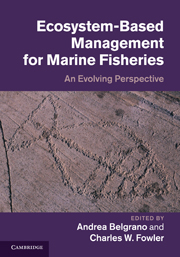Afterword
Published online by Cambridge University Press: 17 February 2011
Summary
An Afterword should probably congratulate the authors, thank the readers for their attention, and gently drop the curtain with a few concluding summary remarks. However, the title and contents of this book clearly point to unfinished business and in the spirit of an evolving perspective I want to end with questions rather than answers. The Introduction proposes that “… a more complete grasp of ecosystem-based management for fisheries will help perceive more clearly the steps that lie ahead” and successive chapters provide a rich source of information and ideas on current approaches to ecosystem-based management for fisheries (EBMF). Many of the emergent issues are tackled in later chapters, particularly Chapter 12. My questions arise from the context within which EBMF has emerged and how this affects our developing view of sustainability and of our relationships with the natural world. The historical and cultural “framing” of EBMF plays a major role in our perception of the steps ahead and in our articulation of goals and objectives. In his Foreword Alec MacCall writes about the difficulty of defining an ecosystem approach (EA) and the concept of “ecosystem health” that goes with it, because they are based in human values. Attitudes towards nature (stewardship, the right to exploit natural systems, avoiding extermination) vary between different cultures and also over time within a culture (Thomas 1983).
- Type
- Chapter
- Information
- Ecosystem Based Management for Marine FisheriesAn Evolving Perspective, pp. 357 - 361Publisher: Cambridge University PressPrint publication year: 2011



